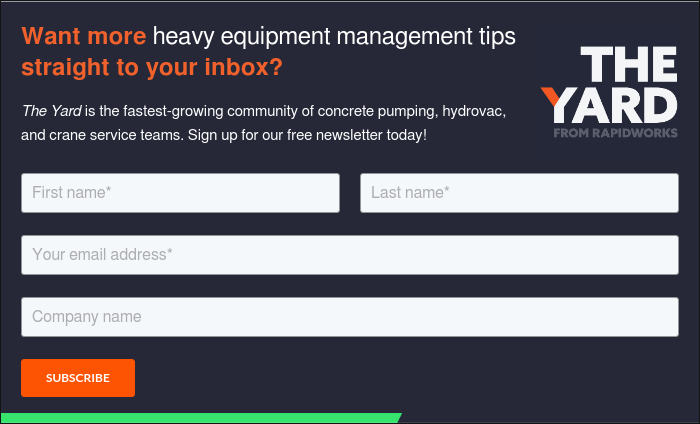
Building a Well-Oiled Concrete Pumping Team: Job Descriptions & Duties
Concrete pumping job sites aren't a solo show. If you run a concrete pumping business, you know it takes a team to succeed. Operators, technicians, managers, dispatchers — each team member has a vital role in the overall success of your project, and they must carry out their duties safely and punctually, or else the project could fail. That's why having the right people in the right places is so important.
Inside this article:
Concrete Pumping Roles You Can't Go Without
As with any construction project, concrete pumping jobs have many moving parts. It takes a series of unique roles to pull off a project, with each team member performing their tasks with excellence.
The exact configuration may vary depending on the needs of your project, but these are the most common concrete pumping roles.
Operational Roles: Job Descriptions, Requirements, and Duties
Concrete pumping projects involve several operational roles. Each one has its own set of job requirements and duties:
- Operators: Concrete pump operators are responsible for the safe and efficient usage and maintenance of concrete pumps. In addition to having the physical fitness needed to perform the job, they should be aware of concrete pumping best practices and adhere to all concrete pumping safety guidelines. Depending on the scope of their duties, a commercial driver's license (CDL) is beneficial, but not always required.
- Common duties: Cleaning out the concrete pump and ensuring its fitness for future use, running the pump during a pour, and monitoring the pump as it moves from point A to point B
- Drivers: While operators are responsible for the concrete pump, drivers are responsible for the vehicle itself. Operators and drivers are often combined into a single role, known simply as a concrete pumper, where the worker operates both the pump and the truck. In this case, it's likely a CDL will be necessary.
- Common duties: Driving the concrete truck to and from job sites, keeping the pump and truck clean and free from grease and concrete, performing light repairs on the pump or truck
- Laborers: Similar to the overlap between operators and drivers, the role of a laborer is often combined into the job description of a concrete pumper. Nevertheless, depending on your job site, it may still be helpful to have additional workers to assist with tasks requiring heavy manual labor and sometimes to offer an extra pair of hands to the team.
- Common duties: Lifting or transferring equipment across the job site, maneuvering around challenging construction environments, providing physical assistance where necessary
- Site supervisors: As with other supervisory roles, a concrete pumping supervisor's job is to ensure successful pours. They must review all regulations pertaining to the site of your project and ensure all employees involved in the project possess the necessary qualifications to complete their tasks.
- Common duties: Coordinating concrete pouring operations with other activities on the job site, adhering to all regulatory guidelines concerning the project, preparing the construction site by addressing any potential concerns or hazards
The exact salary will vary according to location, years of experience, and several other factors, but concrete pumping jobs are generally competitive. According to Glassdoor, the median estimated total pay for a concrete pumper is $79,258 annually, with an average salary of $64,655. Typical benefits include paid time off, health insurance, and a 401(k) plan, though the job may require the ability to work irregular hours.
Maintenance Technicians: Job Description
Operational roles are responsible for correctly carrying out the pour, maintenance technicians take care of other crucial roles.
Maintenance technicians provide the support your project needs to succeed by performing the upkeep needed to keep your concrete pumping equipment working properly. They're in charge of any significant repairs and preventive maintenance required to keep your fleet running at its best, and they may document the need for future repairs or inspections.
Maintenance Technician Requirements
- Completion of any necessary training courses or certifications on concrete pumping equipment maintenance
- Prior experience repairing or maintaining heavy construction equipment
- Solid mechanical aptitude
- Ability to perform physical repair work
Maintenance Technician Duties
- Inspect, diagnose, and perform minor and major repair work on concrete pump equipment components, including:
- Valves
- Controls
- Compressors
- Hoses
- Motors
- Electronics
- Complete preventive maintenance work on the truck to ensure it's ready for the next project.
- Perform troubleshooting on malfunctioning equipment according to technical resources.
- Make recommendations on component replacements.
- Notify supervisors or managers when an issue arises that warrants further inspection.
While Glassdoor doesn't provide a pay range for the specific job title of "concrete pumping maintenance technician," the estimated total pay for a "pump maintenance technician" is $92,240, with an average salary of $67,924. The benefits are the same as those for a concrete pumper.
Pro tip: Give your crew the tools it needs to succeed with Rapid Fleet. RapidWorks' preventive maintenance solution, Rapid Fleet lets you control your fleet maintenance operations all from a single user-friendly dashboard. Generate your preventive maintenance program, sync it with your vehicle's odometer to ensure timely maintenance, and automatically convert maintenance tasks into work orders to ensure the job gets done on time.
Dispatchers: Job Description
While all team members are responsible for representing your concrete pumping business honorably, some jobs are more forward-facing than others. Dispatchers are responsible for receiving calls for your business and sending your fleet out to the job.
Dispatcher Requirements
- Good interpersonal skills
- Ability to work with fleet utilization software
- Ability to coordinate projects, fleets, and personnel
Dispatcher Duties
- Schedule deliveries to project sites.
- Coordinate with operators and other team members.
- Receive inquiries from clients.
- Maintain accurate records to keep track of deliveries and other important information.
According to Glassdoor, the average salary for a concrete dispatcher is $55,344 per year — though the exact amount may vary.
Managers: Job Description
Every team needs a leader, and managers provide the guidance and initiative required to help ensure your concrete pumping business succeeds. A strong concrete pumping manager will have prior hands-on experience as an operator or some other relevant industry experience. They also need the technical and interpersonal skills that will keep your team running effectively.
Manager Requirements
- Prior experience as an operator or pumper often preferred, but not always required
- Good written and verbal communication skills
- Good leadership skills
- Project management experience
- Familiarity with Occupational Safety and Health Administration (OSHA) guidelines and other industry standards
- Up-to-date certifications
- Thorough industry knowledge of leading trends and best practices
Manager Duties
- Oversee the proper operation and maintenance of all concrete pumping equipment.
- Ensure that all materials arrive at the job site on time.
- Conduct inspections and ensure all safety protocols are followed at all times.
- Coordinate with other team members to make sure projects run smoothly.
- Educate team members on concrete pumping safety hazards.
- Keep all projects running on time and under budget.
As with other roles, the exact amount that a concrete pumping manager earns can vary by location and other factors. According to Glassdoor, the estimated average salary and median base salary for a concrete pumping safety manager are $67,000 to 103,000 and $78,000, respectively.
Pro tip: It takes a lot of work to orchestrate all the duties associated with managing your concrete pumping business, so leverage construction management software like RapidWorks to handle all your workflows from one place.
Bringing the Team Together as a Unit
Even if you have all the right pieces in play, your team may still have difficulty working cohesively. Each team member has an essential role in your concrete pumping business, but they need the right tools to orchestrate their efforts and keep everyone on the same page.
Try following these steps to bring your team together:
- Provide clear expectations by writing thorough, detailed job descriptions.
- Equip your team with the right resources to do the job, including training manuals, checklists, and other reference materials.
- Host regular toolbox talks to keep the team aware of safety protocols and OSHA guidelines so everyone stays safe.
- Foster a culture of trust by encouraging communication and being receptive to feedback.
- Facilitate communication by maintaining spaces where team members can share important information, such as work orders, safety protocols, project guidelines, and maintenance tickets.
Investing in the right tools is a great way to set your team up for success. Construction management software will help coordinate your projects and each team member's duties. Tools like RapidWorks provide a centralized hub for managers to review each aspect of their concrete pumping projects, helping them streamline their operations. Review tickets and work schedules, send and receive messages from the back office, and manage your trucks, crews, and jobs from one easy-to-use dashboard — and keep your concrete pumping business running like a well-oiled machine.
RapidWorks helps keep communication seamless between all members of your crew, from dispatchers to operators.
“I like [RapidWorks] because guys can have all their information there. They can see everything like notes that I put in there. They can keep their job status current where I can see what they're doing all the time.” Ed Albin, head of dispatching at Central Concrete Pumping shared.
Ready to see what RapidWorks can do for your concrete pumping business? Schedule a demo today and let us show you how we can help.
